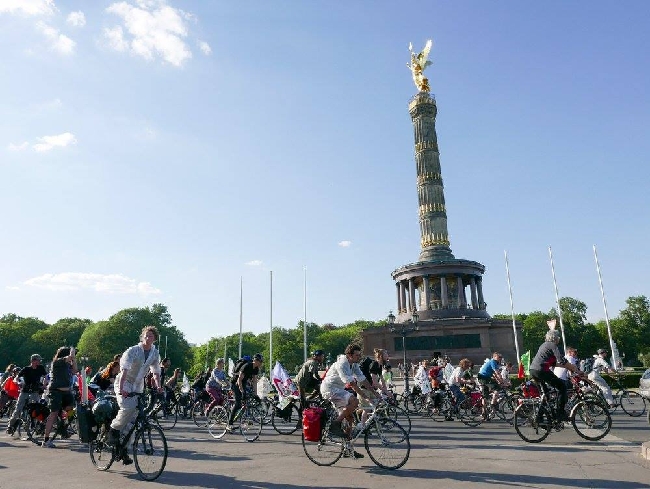In a recently published article in Nature Climate Change, Jeroen van den Bergh argues that neither degrowth nor green-growth strategies might lead to sufficient climate action and hence makes the case for a third option which he calls “agrowth”. While the understanding of degrowth reflected in the article can certainly be disputed – it comes across as mainly targeting a shrinking GDP – his conclusion is built on the analysis of a large body of research on both degrowth and green growth strategies.
Degrowth, he argues, “runs the risk that one ends up with too low a level of GDP, insufficient to support a minimum level of certain components, such as provision of essential public goods”. Green growth, on the other hand, “may not be feasible for two reasons: green policies may not allow for growth; or weak policies, out of fear of harming growth, will not deliver green outcomes. If we further recognize that concern about growth impedes public and political support for urgently needed climate policies, then we have enough motives to become less preoccupied with growth. This gives rise to a third strategy.”
“Agrowth reflects the insight that GDP growth may go along with both progress and regress, depending on the period, context and development stage. This suggests the logic of being ex ante agnostic about GDP growth. Since such a strategy does not give priority to growth or anti-growth it effectively ignores GDP as an overall measure of progress, and hence will be intentionally ignorant about any changes in GDP. In this way, it removes the possibility of imposing ex ante GDP growth or anti-growth constraints in pursuit of human progress (…) Such an agrowth strategy does not beforehand exclude any option, it merely aims to realize acceptable values of all factors that contribute to human well-being, including employment, equity and a stable climate. (…) If one would adopt an agrowth strategy, one would in some periods be willing - as one would be indifferent about GDP movements - to give up potential GDP growth for a better environment, more leisure, more national or international equity, better health care, or a better balance between private and public sectors. For example, if more income equality meant a lower average income (GDP per capita) this would be judged negatively under a pro-growth strategy, as opposed to under an agrowth strategy. More generally, an agrowth strategy would enhance the sociopolitical acceptability of key policies directed at problems that harm social welfare, like inequity and climate change, by not requiring of such policies ex ante that they match some positive, negative or zero growth rate of the economy. (…)It will allow sacrificing some growth if required to meet climate goals, while not excluding a green growth outcome if consistent with these goals. (…) The review of theoretical and empirical studies on growth versus the climate shows that green growth and anti-growth are both risky and not guaranteed to combine climate and social goals. An important advantage of the neutral and precautionary agrowth strategy is that it can bridge pro-growth and anti-growth views and thus reduce polarization in the debate. It does not preclude GDP growth when it is feasible and goes along with improving human welfare, and neither eschews GDP decline if this is an inevitable outcome of policies solving urgent social or environmental problems. Hence, it could create more political space for better balancing of different components of social welfare and supporting serious, effective climate policies.”
According to van den Bergh, the following actions would be worth considering from an agrowth-perspective:
“• Give more systematic attention to the shortcomings of GDP information in all education, and particularly in economics and business management studies at universities.
• Interrogate the preoccupation with growth in journalism, policy circles and politics so as to overcome the automatism with which many give priority to growth. This may require dealing with cognitive biases through debiasing techniques.
• Make political leaders of developing countries aware that an agrowth strategy facilitates a trade-off between less growth in rich countries and development with growth in poor countries, possibly needed to combine the goals of ending climate change and reducing global inequality.
• Put pressure on the IMF, the OECD, and the World Bank to accept a shift to a growth-neutral paradigm. They express a deep concern for climate and other environmental issues, but are caught in ambiguous notions such as ‘beyond GDP’ and ‘beyond growth’.
• Convince politicians to soothe excessive growth expectations that are often not met and then merely contribute to disappointment and economic instability.
• Stimulate debate in politics and wider society about the relevance and means of stepping outside the unproductive pro-growth versus anti-growth frame.”
Van den Bergh concludes: “While an agrowth position does not require that we have an alternative aggregate welfare metric that can replace GDP, trying to implement such a metric worldwide, possibly under auspices of the United Nations, would be helpful. Nevertheless, agrowth without a good aggregate welfare measure already means a considerable improvement over unconditional pro-growth, because sensible trade-offs between social (and/or environmental) goals, notably solving urgent problems, will no longer be frustrated by preoccupation with GDP rise. With a broadly accepted aggregate welfare measure - unfortunately still a distant ideal - agrowth would mean the best of all worlds.”

Endlich ist es soweit: Der erste Satz Texte und Videos aus dem Projekt "Degrowth in Bewegung(en)" ist jetzt online. Hier beleuchten Vertreter*innen verschiedenster sozialer Bewegungen das Thema Degrowth und benennen aus ihrer Sicht die Gemeinsamkeiten und Unterschiede sowie Kritikpunkte an Degrowth. Ziel des Projekts ist ein offener Dialog- und Vernetzungsprozess, der den Austausch, das gegense...
Was heißt das: Zeitwohlstand? In unserem Buch zu diesem Thema haben wir den Begriff nicht eindeutig definiert. Nicht dass wir uns darüber keine Gedanken gemacht hätten. Wir glauben jedoch, dass Zeitwohlstand als Begriff eine Funktion erfüllen kann, für die eine strikte Definition nicht nötig ist und vielleicht sogar hinderlich wäre. Es reicht hier zunächst Zeitwohlstand [...]

Martin Lindner ist Professor für Didaktik der Biologie und Geographie und war Mitorganisator des Buen Vivir-Symposiums an der Martin-Luther-Universität Halle-Wittenberg. In seinem Interview im Rahmen des Stream towards Degrowth zeigt er einige Alternativen zur Wachstumsgesellschaft auf. Stellen Sie sich vor, die Welt erlebt eine Zeit des „guten Lebens“ jenseits des Wachstums. Blicken wir dann, sagen wir [...]